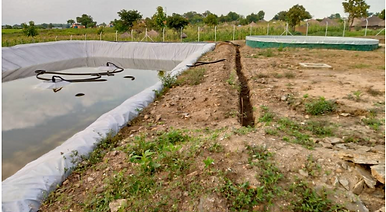Project
Overview
COUNTRY: Uganda
LOCATION: Imvepi Refugee Settlement, Terego district
INDUSTRY FOCUS: Waste management, renewable energy
The Waste to Clean Air project by the Circular Refugee Camps Consortium aims to implement a bio-digester system at the Imvepi Refugee Settlement. The project's key objectives include the production of biogas for clean energy, the creation of tree nurseries for carbon offsetting, and the production of bio fertilizer from bio compost. This initiative is designed to address environmental challenges while improving living conditions and economic opportunities for refugees and host communities.

Problem Statement
The project addresses the urgent need for clean energy and effective waste management in refugee settlements. The current reliance on diesel generators for energy results in environmental damage, high operational costs, and noise pollution. Moreover, the lack of proper waste management leads to methane emissions and health hazards. The project's importance lies in its potential to provide a sustainable solution to these challenges and contribute to climate change mitigation.
Solution
The proposed approach involves the installation of biodigester units, biogas distribution networks, tree nurseries, and biogas bottling facilities. The technology used includes biodigester systems that convert organic waste into biogas and bio compost. This innovative solution not only provides a clean energy source but also contributes to reforestation and improved agricultural productivity.
Project Stages
The project is currently in the implementation phase, with the Living Lab site in Imvepi being set up. Key milestones include the first sludge collection, production of biogas, and the establishment of tree nurseries. The project plans to scale up to 10 individual 50-ton biodigester sites within Uganda and eventually expand to other East African countries.
Impact
The expected outcomes include significant carbon emission reductions, improved air quality, reduced post-harvest losses, and increased revenue for farmers. The project also aims to create employment opportunities, enhance food security through the sale of fruit trees, and provide access to renewable energy for cooking. Additionally, the project focuses on gender equality and social inclusion, empowering women through employment and skilling opportunities.
Stakeholders
-
Consortium of Partners:
-
The project is a collaboration involving several organizations.
-
Biogas Solutions Uganda Ltd: A partner in the consortium.
-
Skill-Ed: A partner in the consortium.
-
SEMiLLA Sanitation: A partner in the consortium.
-
HS Green Energy: A partner in the consortium.
-
-
Community Engagement:
-
The project actively involves local communities, refugees, and host populations.
-
Participation:
-
Ensures the involvement of the mentioned groups in the implementation and operation of the project.
Funding
-
Total Investment Needed: 27.3 million Euros
-
Stages and Their Funding:
-
Seed Funding: 0.8 million Euros
-
Invest Stage: 1.5 million Euros
-
Scale Stage: 25 million Euros
-
-
Funding Secured: 1.2 million Euros from development and aid organizations
-
Current Funding Focus: Scale stage
-
Scale Stage Objective: Expansion to 10 individual 50-ton biodigester sites across Uganda
-
Investment for Scale Stage: 25 million Euros
.png)



